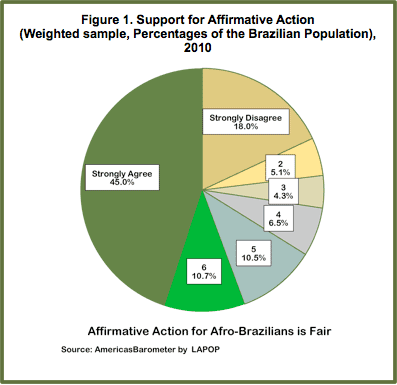Affirmative action programs have spread rapidly across
In fact, a recent study by the Universidade do Estado do Rio de Janeiro found that 70 percent of
But outside of the media limelight, what does the average Brazilian think? New data from the 2010 round of the AmericasBarometer surveys by the Latin American Public Opinion Project (LAPOP) provide a window on ordinary Brazilians’ views.
The most salient finding is the high level of support for affirmative action when respondents were asked if it’s fair for public universities to reserve spaces for Afro-descendants (people who are black or mulatto). [See Figure.] Nearly half of Brazilians strongly agree that reserving university spots for blacks and mulattoes is fair, and more than two-thirds are at least somewhat favorable to this statement (represented by a score of 5, 6 or 7). At the same time one in every six Brazilians is strongly opposed to affirmative action.

This high level of support is striking. But two points should be noted. First, access to higher education is outside the reach of most Brazilians, black or white. The average Brazilian might be more magnanimous with a university slot that he or she has little hope of accessing in any case than with something closer to home. Second, the research does not directly address the hidden trade-off, namely that a slot given to an Afro-Brazilian will likely mean one less space for a white applicant.
What explains the extent to which individual Brazilians agree or disagree with university quotas for Afro-descendants?
A university education (compared to having a primary education or lower) is the single strongest predictor of attitudes on this issue. The university-educated disagree much more strongly with the statement that university quotas are fair than respondents of any other educational group. The conclusion: Brazilians who are already university educated are most likely to perceive affirmative action as at best unnecessary and at worst a threat to the future educational advancement of their own children and social network members, who would presumably have access to higher education without such programs.
Furthermore, those with secondary educations also have significantly lower support for affirmative action than do those at lower educational levels. This means that the strongest opposition to affirmative action in education comes from those who are already benefiting from (or have benefited from) the system prior to the introduction of affirmative action. And income is also a significant predictor; as Brazilians’ incomes increase, they become more negative regarding university quotas for blacks.
However, those with the least at stake are the most supportive of affirmative action. These are the people with very low educational levels who would be unable to access universities in any case. Even with affirmative action, Afro-Brazilians must take an entrance exam known as a vestibular and must complete high school to get into a university. Those with an 8th grade or lower formal education have little opportunity to clear these hurdles. As a result, affirmative action within universities does not benefit the poorest of the poor; rather, it gives a leg up to Afro-Brazilians who are already in the top half of the educational distribution.
Results for other demographic factors are mixed. Older Brazilians are much less supportive of affirmative action, while gender does not have a significantly effect. And attitudes do vary significantly by region. Support for affirmative action is lower in the South than in the Southeast or Northeast, but not significantly so. However, support in all three regions is substantially lower than in the North and Center-West regions, representing the less populated, more isolated states surrounding the Amazon and the grasslands and wetlands known as the Pantanal.
Is Race a Factor?
The respondent’s race is an important factor in determining his or her attitudes toward affirmative action, with whites being less favorable toward this program. However, among those with the lowest educational levels, there are essentially no racial differences in support for affirmative action. This supports the scholarship that has found little racial conflict among the lowest status Brazilians. But a racial gap begins to open up among those with secondary education. And for the university-educated, this gap grows even wider. That is, university-educated Afro-Brazilians are much more supportive of affirmative action than are university-educated whites. At the same time, even for non-whites, a university education is associated with lower support for affirmative action.
Taken together, the findings for education, race and income suggest that self-interest plays a very important role in determining which Brazilians support affirmative action. Those with more education, money and who are whiter are less supportive of affirmative action in a country in which average public opinion highly supports it.
Policy Implications
Still, there are limits to such a coalition. An important and powerful minority strongly opposes affirmative action, and this group includes the wealthiest and best-educated Brazilians. These are the citizens most able to write letters to the editor, to lobby their federal deputies and to participate in marches. The reality is that the voices of a powerful minority may be louder than those of the majority—a potential threat to broader affirmative action policies.
This Americas Quarterly report is an excerpt from the AmericasBarometer Insights Series from the Latin American Public Opinion Project at Vanderbilt University.
(Homepage thumbnail photograph by Everton Zanella Alvarenga.)







